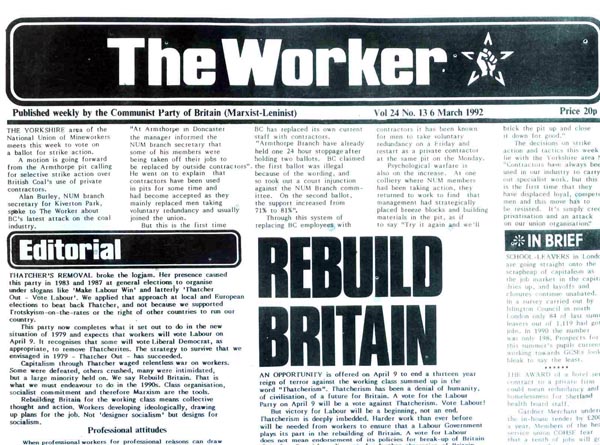Our tenth article to mark the 40th anniversary of the CPBML by looking at the past four decades through the eyes of Workers and its predecessor, The Worker. This month: Rebuild Britain!
1992: The response to Thatcher – Rebuild Britain
WORKERS, NOVEMBER 2008 ISSUE

|
Absolute decline and deindustrialisation ravaged our working class in the 1970s and 1980s. Following the call of our Ninth Party Congress in 1991, The Worker featured applications of the Rebuild Britain line. We espoused it then, but continue to do so now, when the need is even more urgent as the decay of our country has deepened and widened. The editorial in The Worker issued on 6 March 1992 read:
“Capitalism through Thatcher waged relentless war on workers. Some were defeated, others crushed, many were intimidated, but a large minority held on. We say Rebuild Britain. That is what we must endeavour to do in the 1990s. Class organisation, socialist commitment and therefore Marxism are the tools.
Rebuilding Britain for the working class means collective thought and action. Workers developing ideologically, drawing up plans for the job. Not ‘designer socialism’ but designs for socialism.
When professional workers for professional reasons can draw up letters and petitions, signed by hundreds but agreed by thousands of colleagues, rejecting damaging legislation on science, education and health – having discussed them in unions like AUT, NATFHE,
BMA, MSF and NUT – then they have started to plan and design what they do want. Rebuilding starts by rejecting destruction.
From 1937, when engineering workers and shop stewards led by communists worked to rebuild trade union strength, so laying the basis for war-time and post-war advance, the organised working class struggled and moved forward over forty years. After two generations of this, mass unemployment seemed a feature of the Thirties beyond modern comprehension.
Thatcher changed all that. Where there had been comfortable assumptions that the worst of capitalism had been behind us, her class proved otherwise. In no time, pessimism, dull conformity and deference to the status quo held sway. In that atmosphere, destruction flattened parts of the industrial landscape.
But Britain could not be built in a decade and, for all the destruction of the 1980s, could not be destroyed in a decade. Robust remnants of a country that grew over centuries now provide potential for its necessary reconstruction.

|
| The Worker, 6 March 1992: a challenge for the working class. |
…We are for rebuilding and strengthening of the trade unions that defend living standards of workers. We call for lifting of anti-union laws that limit workers wanting to offer solidarity to fellow workers in struggle. We do not think unions should be destroyed or kept at arm’s length. Unions have long had policies that could rebuild this country, and should be encouraged.
All the capitalist parties are for membership of the EC and monetary union – foreign domination – but we say Rebuild Britain.”
In the editorial of the issue of The Worker published on 9 September 1997, under the headline “Rebuild Britain for all its people”, the theme was expanded upon again:
“Three years ago this Party was one of the few voices identifying our political and economic independence from the EU as one of the most important steps towards building a new Britain, operating in the interests of its people rather than international finance. Now the issue is identified as one of the top priorities in the election. Faced with hostility to the single currency from many workers both the Tories and Labour moved away from their preferred pro-EU position to one that was less in direct conflict with the electorate.
After the election the tendency of many MPs, both Labour and Tory, will be to re-embrace the EU. Our determination as workers to rebuild Britain can not allow such backsliding. The need for progress means that Britain’s future lies outside the EU straightjacket, in creating an independent country that is beholden to no one – not to America, not to the multinationals, to the Bundesbank or the EU.
Our priorities are at home – rebuilding our economy, declaring war on unemployment until it is eradicated completely, and developing the education system to meet the needs of an independent modern Britain. Only
then will we have a viable future. It is a future worth working for, not only because the alternative is so bleak, but because such a future is as attainable as it is necessary.
WHAT BRITAIN REALLY NEEDS
- A national plan to end unemployment
- Imposition of import and export controls
- Investment of available funds into industry, including research
- Cut spending on the army, foreign office and withdraw from Ireland
- Redirect funds into education and training at all levels
- A health care system based more on prevention than cure, and on cooperation, not competition
- Withdraw from the European Union and focus on rebuilding Britain.”
These ideas from 1992 and 1997 are just as relevant, just as pressing, today. The fool’s paradise of financial speculation and the supremacy of finance capital over industry have been starkly revealed over the past year. We need to rebuild the true foundations of our real economy, in which industry and manufacture must be to the fore.